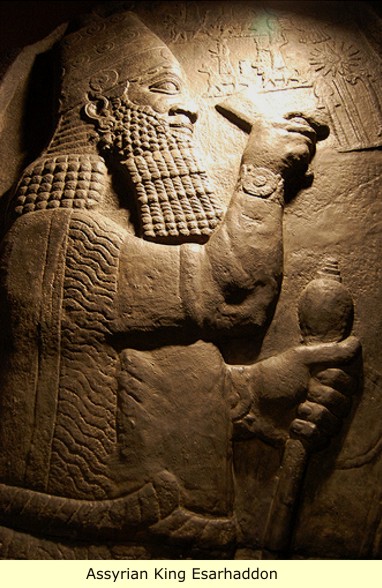
38 And it came to pass, as he was worshipping in the house of Nisroch his god, that Adrammelech and Sharezer his sons smote him with the sword; and they escaped into the land of Armenia: and Esarhaddon his son reigned in his stead.
Praise The Lord JESUS CHRIST!!!
Praise The Lord JESUS CHRIST!!!

This relief belonged to a monument that was probably erected in Babylon. It depicts King Esarhaddon, followed by his mother Queen Nakija, the wife of Sennacherib. The text commemorates the return of the statue of the god Ea to the temple of his son Marduk, the great god of Babylon. Sennacherib had burnt and razed Babylon. In the first year of his rule, his son Esarhaddon rebuilt the holy city, under the influence of the queen mother, who was keen to have her native city restored.
A decorative element
This metal relief was originally covered with gold leaf, of which a few traces are still visible. Such bronze plaques were often used as wall decorations, but this plaque is thicker than those used to cover the gates of the Assyrian palaces at Balawat and Khorsabad. This fragment was more likely to have decorated the base of an altar or a throne; from the evidence of the inscription that covers it entirely, it was probably in the temple of Marduk in Babylon.
A royal representation
Only a fragment of the image remains, but the inscription clearly identifies King Esarhaddon and his mother Queen Nakija, both depicted in a religious scene, perhaps part of a procession. The king is wearing a beard and the truncated conical tiara of the Assyrian sovereigns. The queen's crown is crenelated, like the one worn by the wife of King Ashurbanipal on the relief known as the "Garden Party relief," now in the British Museum, London. Esarhaddon is holding a staff or weapon in his left hand, no doubt an insignia of power, while Nakija has a mirror. Both are making the same ritual gesture with their right hands, lifting what seems to be a flower bud or little stick to their noses, as a sign of prayer or humility before the gods who - if we refer to the historical context - are angry and must be appeased.
An important historical testimony
Women are seldom represented in Assyrian art and seem to have had little influence in public life. Some emblematic female figures make an exception to the rule, however, and this relief is an example. Nakija, the wife of king Sennacherib (704-681 BC), managed to impose her son Esarhaddon as the successor to the Assyrian king, although he was not the eldest heir. This choice probably led to the assassination of Sennacherib and a brief civil war in the early years of Esarhaddon's reign. Sennacherib, tired of the revolts stirred up by the Chaldeans, had ordered the destruction of the holy city. In the first year of his reign, Esarhaddon began to rebuild the city, making it more magnificent than ever. The relief commemorates the restoration of Babylon, and the return of the gods exiled by Sennacherib. The text celebrates the return of the statue of the god Ea, to the temple of his son Marduk. The queen mother, who was born in Babylon and wished to see her native city restored to its former glory, was probably behind this change in policy. Nakija wielded considerable power throughout her son's reign and no doubt encouraged the accession to the throne of her grandson Ashurbanipal - to the detriment of his twin brother - on the death of Esarhaddon. She certainly inspired classical Greek authors for the legend of Semiramis.
No comments:
Post a Comment